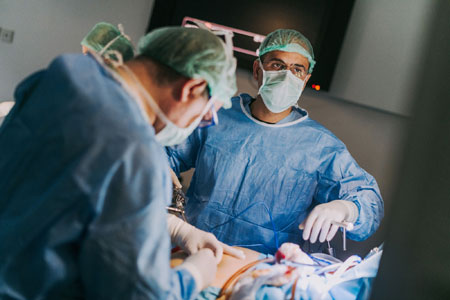What is Gastric Sleeve Surgery?

Gastric Sleeve Surgery is the surgical process of turning the stomach into a tube.
When the digestive system is examined, we encounter an image like a “plumbing”!
The esophagus, the intestines, all are organs in the form of elongated tubes.
There is an exception: Our stomach!
Our stomach is like a warehouse.
Therefore, it draws attention with its "pouch" shape, not "tube".
This is where the definition of "Tube Stomach Surgery" comes from. Because, with surgery, a large part of the stomach is irreversibly removed from the body and turned into a system that continues with the esophagus and intestines. The stomach turns into a tube shape.
No foreign body is placed in the stomach in Gastric Sleeve Surgery surgery. It is called “Stomach Tube Surgery” because of the shape of the stomach after the surgery.
After Gastric Sleeve Surgery, the volume of the stomach is reduced.
However, this is not its only effect on the body.
This operation also has a serious effect on the hunger hormone secreted from the stomach.
After the surgery, the person's desire to eat decreases, the brain feels less hungry, so Gastric Sleeve Surgery surgery creates not only mechanical effects but also hormonal effects.
In Which Diseases Is Tube Stomach (Gastric Sleeve Surgery) Surgery Used?
'Morbid Obesity' is a term that describes you as being overweight.
If this term is used for a person, it means there is danger.
If it is not possible to reach your ideal weight with diet and sports, then the need for treatment arises.
Sleeve gastrectomy is primarily a treatment for morbid obesity.
Many diseases that accompany morbid obesity, including type 2 diabetes, benefit greatly from this surgical treatment. However, the success of bypass group surgeries is higher in cases where the main target is not obesity but type 2 diabetes.
In addition, Gastric Sleeve Surgery surgery can be used as a transition surgery in patients with severe obesity. Sleeve gastrectomy can be used to prepare patients who are overweight or obese for bypass group surgeries.
Can Gastric Sleeve Surgery Be Applied to Anyone With Weight Problems?
Some conditions need to be met for Gastric Sleeve Surgery.
Let's take a look at these conditions and test ourselves if necessary.
Of course, your specialist will make the decision.
Who can undergo Gastric Sleeve Surgery?
Those with a Body Mass Index over 40 kg/m² (morbidly obese, i.e., severely obese).
Those with a Body Mass Index between 35 and 40 who have problems such as type 2 diabetes, hypertension, and sleep apnea due to obesity are also considered morbidly obese and may need to undergo gastric reduction surgery.
In addition, patients with "new" type 2 diabetes and metabolism disorders due to obesity and with a Body Mass Index between 30 and 35 can be operated with the decision of the obesity doctor.
Obesity surgeries are not for aesthetic purposes, that is, to make the person look slimmer.
It is a treatment!
Sleeve gastrectomy is not recommended for cosmetic weight loss requests, patients outside the age limit of 18-60, alcohol or substance addicts, and those with very serious heart or lung diseases.
Up to What Age Is Gastric Sleeve Surgery Performed?
Sleeve gastrectomy surgery is performed on people between the ages of 18-65. In order for the person to be a suitable candidate for gastric surgery, the Body Mass Index (BMI) values determined by the World Health Organization must be 35 and above.
For people under the age of 18, the presence of the above-mentioned diseases is important along with the degree of obesity, and parental approval is required as well as physician decision.
For people over the age of 65, the health status and the necessity of surgery (the person's weight-related problems) are evaluated.
Tests to be Done Before Gastric Sleeve Surgery Surgery
If it can be done before the surgery, a diet should be done and some weight should be lost. This procedure both reduces the risks associated with surgery and facilitates the surgical procedure as it reduces the size of the liver.
Before bariatric surgery, the patient's height and weight are checked, and their suitability for surgery is examined. If the patient has a concomitant disease that they know and the regular drugs they use, they should definitely share it with the doctor. If there is no obstacle to the operation, the patient will undergo a detailed examination process.
These tests are:
Blood tests
PFT (pulmonery function test)
ECG
Lung X-ray
Whole Abdominal USG
Stomach is evaluated by endoscopy before surgery for possible gastric pathologies.
Additional tests may be requested from patients with comorbidities. After the tests are done, they are evaluated by the endocrinology, chest diseases, cardiology and psychology units. Finally, the patient undergoes an anesthesiologist examination with the reports and tests of other doctors. The anesthesiologist makes a risk determination in advance by looking for answers to the questions such as, 'Is there any obstacle for the patient to receive anesthesia? If yes, what kind of measures should be taken?'. If there is an obstacle to the operation, the operation can be canceled or the treatment process suitable for the disease is applied, and then the operation can be performed. Solid foods should be stopped 12 hours before the operation and liquid consumption should be stopped 8 hours before the operation.
How Gastric Sleeve Surgery Surgery is Performed?
Sleeve gastrectomy is an operation performed under general anesthesia.
Sleeve gastrectomy is almost always performed with closed, that is, laparoscopic methods. According to the surgeon and the patient, it can be done through a single hole or 4-5 holes in the body and even with a robot. Since the holes are very small, it does not cause problems in the future in terms of aesthetics.
In order not to make a mistake during the surgery and not to make the stomach too small, a calibration tube is placed at the stomach entrance with the diameter of the esophagus. Thanks to this calibration tube, the stomach is reduced as if it is the continuation of the esophagus, and excessive stenosis and obstruction are prevented.
After taking precautions regarding vascularity and bleeding, the stomach is cut from length to length with special cutting and closing tools (stapling).
After the procedure is finished, the calibration tube placed at the beginning of the surgery is removed.
During the operation, one or more different techniques are used to test whether there is a leak or not. Similar tests can also be done after surgery.
Sleeve gastrectomy is an excellent surgical procedure for morbid obesity. Usually more
50% of the weight is lost in the first 6 months after surgery and 75% is lost within 12 months.
What are the Risks of Gastric Sleeve Surgery?
Although very rarely, life-threatening complications may develop in gastric reduction surgeries.
Some risks, such as bleeding or leakage after Gastric Sleeve Surgery, can be life-threatening for the patient, even at 1%.
Specialist surgical teams have the training and equipment to take necessary actions against possible complications.
Sleeve gastrectomy is a major surgery. As with all other major surgical operations, there are various risks after surgery. The risks of Gastric Sleeve Surgery increase as the patient's age and weight increase.
However, when we consider the risks of Gastric Sleeve Surgery and gastric bypass surgery, the risk of death is one of the least likely surgeries. This risk is as much as gallbladder surgery.
According to scientific studies, the risks of appendicitis and gallbladder surgery in obese people are slightly higher than in thin people. However, this risk does not mean death. For example, while the early mortality rate in cardiovascular surgery is around 2 percent, it is 1 in a thousand in gastric reduction surgery.
Before Gastric Sleeve Surgery surgery, patients are thoroughly informed about these risks by the doctors who will perform the operation.
It should be noted that the risks associated with obesity are much higher than the risks of Gastric Sleeve Surgery surgery.
Risks related to other health problems, such as fatty liver, risk of kidney diseases, diabetes or high blood pressure, are eliminated in morbidly obese people who have gastric sleeve surgery. Therefore, gastric reduction surgery is an operation that is both low-risk and reduces the risk of other surgeries.
Advantages of Gastric Sleeve Surgery
It is a surgical technique with very good results in moderately and severely obese patients.
It can be performed laparoscopically (closed), so wound healing is faster, pain is less and hospital stay is shortened.
Obesity-related co-morbidities such as hypertension, sleep apnea and diabetes improve by 70-80% after surgery.
This technique does not require intestine cutting and reconnection.
There is no change in stomach functions, only the volume of the stomach decreases. Therefore, any type of food can be consumed normally, albeit in small quantities.
The majority of patients lose 50% of their excess weight in the first 6 months after surgery.
As a result of the removal of 75% of the stomach wall, the production of the hormone Ghrelin, which gives a feeling of hunger, is mostly eliminated and therefore the feeling of hunger is reduced.
Sleeve gastrectomy is a simpler operation than gastric bypass.
As with procedures bypassing the small intestine, no malabsorption occurs in minerals and vitamins, which may be important in elderly patients.
Dumping syndrome does not occur and sugar and sugary foods can be tolerated better.
There is no foreign device in the body as in the gastric band (stomach clamp).
It gives the chance to plan for other bariatric surgery operations when necessary.
Late postoperative side effects are rare. However, late complications can be seen at a rate of 25% in gastric band and 10% in gastric bypass.







